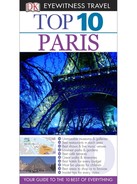Planning Your Trip
NOTE
For more information see Luxury, Romantic, Budget, Medium-Priced, Famous-Name and Family-Friendly hotels as well as those in Great Locations.
When to Go
April in Paris may be a cliché but it is still a good time to visit. Spring and autumn are both pleasant and there are plenty of parks and tree-lined boulevards to enjoy. Although certain restaurants close in August, when most Parisians take their holidays, there is still plenty to see and do.
Choosing an Area
The Left Bank is a good choice if you like a Bohemian atmosphere of cafés and student life. The Marais has many museums, shops and restaurants and the Opéra and Louvre quarters are central to everything. To save money, stay just outside the centre and use the excellent yet cheap metro.
Choosing a Hotel
If space is important, ask about the size of the rooms: some can be very cramped. It is also worth checking whether the rooms face busy, noisy roads and what is the hotel’s nearest metro station. Ask if there is an elevator to all floors, as in some older buildings this may not be the case.
Parisian hotel
What to See
Don’t expect to see the whole of Paris on a weekend visit – you would not even see the whole of the Louvre in this time. Even on a longer visit, don’t be over-ambitious: leave time for wandering the streets or relaxing in a bar or café, the way the Parisians do. It’s all part of the experience.
What to Pack
The weather can be unpredictable, so allow for unexpected cold or wet spells at almost any time of year by bringing a pullover, umbrella and comfortable shoes. Parisians are casual but chic, so take a few smart outfits for dining out. Only the most expensive restaurants require men to wear a tie.

How much Money to Take
You can use the major credit cards (Visa, MasterCard, American Express) almost everywhere, and there are cash dispensers (ATMs) all over Paris which display symbols of cards they accept. Make sure you have a few euros in cash when you arrive, however, to pay for metro tickets or a taxi. Bureaux de change offices also abound throughout the city.

Passports and Visas
No visa is required for citizens of EU countries, the USA, Canada, Australia or New Zealand if you are staying for less than three months, although your passport will need to be valid for at least three months beyond the end of your stay. Citizens of other countries should consult their French embassy or consulate for information before travelling.

Customs
For EU citizens there are no limits on goods that can be taken into or out of France, provided they are for your personal use. Outside the EU, you may import the following allowances duty-free: 200 cigarettes or equivalent in tobacco; 4 litres of wine, or 2 litres of wine plus 1 litre of spirits; 60ml of perfume and 250ml of eau de toilette; €350 worth of other items.
Travelling with Children
Parisians dislike enfants terribles, so always try to ensure good behaviour. Some hotels allow kids to sleep free in family rooms (see Family-Friendly Hotels). Children are seldom seen in restaurants at night, but there are plenty of child-friendly alternatives.

